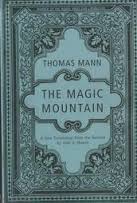
In 1912 Thomas Mann’s wife, Katja, stayed in Dr Friedrich Jessen’s ‘Waldsanatorium’ from March to September, suffering from a lung complaint. Mann himself visited her for four weeks in May and June. During that time, he said, he suffered a troublesome catarrh of the upper air passages, owing to the damp, cold atmosphere on the balcony. The consultant diagnosed a ‘moist spot’ of tubercular infection, just as Dr Behrens in the novel diagnoses Hans Castorp. Mann, however, did not stay in the magic mountain, but hastened back to Flatland and Munich, where his own doctor advised him to pay no attention. There is an ironic twist to this story which would have amused the novelist — Katja, it appears was misdiagnosed, whereas Mann himself, in his post-mortem, was indeed seen to bear the marks of an earlier tubercular illness.
This is the biographical germ of the novel. Its intellectual germ is related to Mann’s great novella, Death in Venice. Death in Venice was a classically constructed tragedy of the fall of a great artist and intellectual. The Magic Mountain was to be the satyr play that accompanied the tragedy — the comic and parodic tale of a jeune homme moyen sensuel, caught up in the dance of death, amongst the macabre crew of the sanatorium. Both tales represented the fate of someone out of context, on a holiday visit, encountering love, sickness and death with a peculiarly German mixture of fascination and resignation.
Work on the novella was interrupted by the First World War. Mann spent the war years writing passionately in support of the German cause. His ‘Thoughts in War’, his praise ofFrederick the Great as a man of action, his Reflections of an Unpolitical Man, are definitions of the German genius which, he asserts, is concerned with Nature, not Mind, with Culture as opposed to Civilization, with military organization and soldierly virtues. Culture is compatible with all kinds of horrors — oracles, magic, pederasty, human sacrifice, orgiastic cults, inquisition, witch-trials etc. — by which civilization would be repelled; for civilization is Reason, Enlightenment, moderation, manners, scepticism, disintegration — Mind (Geist).*

